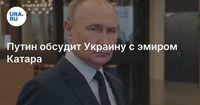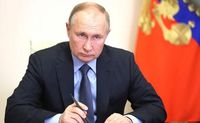Russian President Vladimir Putin is set to meet with the Emir of Qatar, Tamim bin Hamad Al Thani, on Thursday, April 17, 2025, in Moscow. This high-profile meeting comes as both leaders aim to strengthen bilateral cooperation and address pressing international issues, including the ongoing conflict in Ukraine and the broader situation in the Middle East.
The Kremlin has confirmed that the discussions will focus on various aspects of Russian-Qatari relations, particularly in the realms of trade, economics, and humanitarian efforts. Dmitry Peskov, the press secretary for President Putin, emphasized that the meeting would provide an opportunity for both leaders to exchange views on vital regional matters, especially concerning Ukraine.
Qatar has emerged as a key mediator in the delicate process of reuniting families separated by the conflict between Russia and Ukraine. The nation has played a pivotal role in facilitating the return of numerous children to their parents and relatives across both countries. Notably, in March 2025, Qatar helped orchestrate the return of five children from Russia to Ukraine, while also facilitating the return of one teenager from Ukraine to Russia.
During this upcoming meeting, Putin and Al Thani are expected to delve into the humanitarian aspects of their cooperation, aiming to enhance their collaborative efforts in addressing the needs of families affected by the ongoing hostilities. The discussions may also touch upon Qatar's broader role in international diplomacy, particularly regarding Middle Eastern affairs.
As the world grapples with the ramifications of the conflict in Ukraine, the involvement of nations like Qatar in mediating humanitarian efforts underscores the importance of international cooperation in resolving complex geopolitical issues. The Kremlin's announcement of this meeting highlights Russia's recognition of Qatar's influence and capabilities in facilitating dialogue and reconciliation.
In the context of the ongoing war in Ukraine, the humanitarian efforts led by Qatar serve as a reminder of the human cost of conflict. The reunion of families separated by war is a poignant aspect of the broader narrative that often gets overshadowed by political and military developments. The discussions between Putin and Al Thani may help to shed light on the importance of humanitarian interventions in conflict zones.
Moreover, the meeting could also signal a strengthening of ties between Russia and Qatar, particularly in light of the evolving geopolitical landscape. As both nations navigate their respective challenges, their partnership may prove beneficial in addressing shared concerns and fostering stability in their regions.
In addition to humanitarian issues, the leaders are likely to discuss trade and economic cooperation, which have been a focal point of Russian-Qatari relations. Both countries have expressed interest in enhancing their economic ties, particularly in the energy sector. Qatar, as a major natural gas producer, and Russia, known for its oil exports, have the potential to collaborate effectively in energy markets.
The upcoming talks between Putin and Al Thani reflect a broader trend of increasing diplomatic engagement among nations seeking to navigate the complexities of contemporary international relations. As the global landscape continues to shift, the importance of dialogue and collaboration cannot be overstated.
As the Emir of Qatar visits Moscow, the world will be watching closely to see how the discussions unfold and what implications they may have for the ongoing conflict in Ukraine and the geopolitical dynamics in the Middle East. The meeting represents not just a bilateral engagement but a potential step towards greater international cooperation in addressing the pressing challenges of our time.
In conclusion, the meeting between President Putin and Emir Al Thani is poised to address significant issues that resonate beyond the borders of their respective nations. With humanitarian concerns at the forefront, the discussions may pave the way for more comprehensive approaches to conflict resolution and international collaboration.





